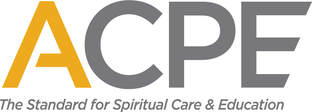|
Who We Are
2022 marked the 150th anniversary of when St. Mark's Hospital was founded by the Episcopal Church in Utah. It continued under this direction until its transfer to Hospital Corporation of America (HCA) in the late 1980's. In 1984, St. Mark's Hospital and Episcopal Community Services (ECS) created the only ACPE chaplain education program in Utah. As the flagship hospital within the MountainStar Division of HCA, St. Mark's continues its support of the spiritual care services and nationally accredited CPE program. Today, ECS is a trusted partner of HCA in Utah, with the depth, capacity, and elasticity to meet hospital needs for professional chaplains. To learn more about ECS, refer to www.ECSutah.org. |
ACPE is the only agency recognized by the United States Department of Education (USDE) to accredit
Clinical Pastoral Education (CPE) programs in the United States.
ECS Spiritual Care & Education Center at St. Mark’s Hospital is accredited for CPE Level I/II and CPE Educator Program. Accreditation is a primary means of quality assurance in the field of CPE. For more than 40 years, the ECS Spiritual Care & Education Center has maintained ACPE accreditation standards providing lasting benefits to emerging professional chaplains, seminary students, community clergy, military-bound chaplains, and healthcare providers.
Through Its Accreditation Process, ACPE Seeks to:
In addition, ACPE programs prepare students for board certification as well as to continue on in a Supervisory Education program, which can lead to ACPE Educator Certification.
Benefits of Accreditation with ACPE:
Through Its Accreditation Process, ACPE Seeks to:
- assure quality and promote excellence in CPE programs;
- promote the involvement of faculty and staff in self-assessment of the center and engagement in continuous quality improvement processes;
- assure students of consistency in educational programs;
- promote fairness in conduct and evaluation of educational programs;
- integrate unique clinical/educational resources based on clearly identified learning objectives;
- ensure that the students gain the knowledge and skills necessary to fulfill the roles of spiritual care as clergy and lay leaders as well as to develop professional skills for chaplaincy.
In addition, ACPE programs prepare students for board certification as well as to continue on in a Supervisory Education program, which can lead to ACPE Educator Certification.
Benefits of Accreditation with ACPE:
- The Accreditation process provides an impetus towards continuous improvement—the reflective institutional self-study provides a starting point for ACPE accredited Centers to review their practice, evaluate their programs and receive feedback from professional peers, and the annual, five and ten year reviews ensure ongoing compliance with ACPE standards.
- The Accreditation process gives an ACPE accredited Center greater recognition in the larger community. By completing the ACPE process, each ACPE accredited Center joins the ranks of institutions who have met the professional standards of ACPE and continue to excel in their missions.
- The Accreditation process is an external, objective assessment of an ACPE accredited Center’s programs that gives assurance to the community about the quality of the program being offered.
- The Accreditation process offers guidance in developing and sustaining institutional functions.
- The Accreditation process helps ACPE accredited Centers to justify staffing and programmatic needs.

